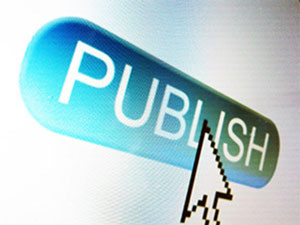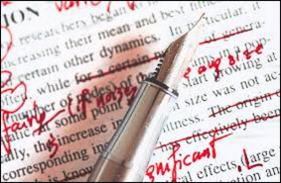|
My fifth post about writing and publishing as an indie author. The last post was ‘Create a polished manuscript’ (bottom line: finish it, edit it, have friends edit it, have a professional edit it).
Topic #5: Self-publishing vs. traditional publishing. You’ve finished writing and editing your book. Now you’re ready to do something with it. The question is, publish it the traditional way or self-publish it? You can read endless debates on this question online. I will take a streamlined approach and explain what is best for me. First, quick summaries of the two choices (for fiction novels): TRADITIONAL PUBLISHING: For novels, typically you find an agent to represent your work to sell it to a publisher. Send a cover letter, the first few pages, and perhaps a synopsis of your novel to several agents at a time. If an agent thinks it might be of commercial value, she will request the entire completed novel. It can take months or years to procure an agent willing to represent it. Your agent will then try to sell your novel to publishers. This can take months or years, or may never happen at all. Once your novel is sold to a publisher, there is an extensive period of negotiating, editing, and printing. Expect 18 months between signing the contract and seeing the book in print. SELF-PUBLISHING: First, choose a publishing service (Amazon is the largest, but there are others such as Lulu, Bookbaby, Barnes and Noble). Create a free account. Format your book for an ebook and for a print book (if you want a print version). Upload the two formatted files. Upload your cover design (cover designs are a topic for another post). Set the prices for the ebook and print book. Your book then becomes available for sale on the service’s web site. There is no cost involved, other than a percentage of sales. Yes, both descriptions are oversimplified for the sake of brevity. Two reasons self-publishing is best for me: First, it is much faster (traditional = 2 to 6 years, self-publishing = a few days to a few weeks). Second, self-publishing allows far more creative control (including editing and cover design). I want people to read my stories now. I am 55 years old and simply not willing to wait years. I also love being in control of the design of the covers of my novels, not to mention the plot, tone, pacing, and voice. I can set the price. I can have promotions and giveaways. I can switch to a new cover design. I can make improvements to the text and upload them to replace previous versions. When I finish the sequel to Diffusion and Infusion, it will take about a week to make it available to readers (by the way, the title of the third book will be PROFUSION!). Think you cannot become successful by self-publishing? Hugh Howey, Joe Konrath, and a growing number of best-selling self-published authors might disagree. Bottom line: For me, self-publishing is best, hands-down. It’s faster, and you have more control.
0 Comments
My fourth post about writing and publishing as an indie author. The last post was ‘Plot and write a novel’ (bottom line: There are as many approaches to this as there are writers. Just do it.).
Topic #3: Create a polished manuscript. So, you write and write (and write) until you have the first draft of a novel. Here’s a secret: all first drafts are terrible. There, I said it. But I’m not the only one. Here's a quote from Ernest Hemingway: “The first draft of anything is shit.” That leads us to a quote from E.B. White: “The best writing is rewriting.” My translation of what these writers were trying to say: Get your first draft done. Don’t worry too much about the quality. Rewrite it again and again until it is good. And then keep rewriting until it is even better. What works best for you when you edit your writing? Here is my three-step process to create a polished manuscript: Step 1: Self-editing. Go through it numerous times, because you’ll find more improvements to make every time. Read it out loud (to your spouse, your friend, or your dog). You’ll be surprised at how helpful this is in assessing the pacing and flow. Step 2: Ask your friends to edit it. Maybe they aren’t professional editors, but they’ll have some suggestions, and they may have a good grasp of grammar and punctuation. They can even give you tips on effectiveness of the plot. And they’re inexpensive. They might do it for a pizza. Step 3: Have at least one professional-level editor go through it. As an indie author, there is a risk of avoiding this due to the cost. But if you want to try to sell your novel, this is one of the two things you absolutely must invest in (the second is a professional cover design). You can expect to pay from $4 to $12 per 1000 words of your novel. A typical price would be $5, so this would be $400 for a novel of 80,000 words. You can easily hire editors on web sites such as: https://www.fiverr.com/ To be sure an editor can do professional-level work, look at their reviews and ratings (I can recommend several). Tip: do not do this step until you have edited to the best of your ability. You want your professional editor to do what you cannot, rather than paying them to do what you can do yourself. Bottom line: finish your first draft, edit it yourself (over and over), have friends edit it, and finally, have a professional editor work on it. Happy writing! I want to share a series of stories I have written (and am still writing) that explore the nature of love. These stories will eventually end up in a compilation for sale on Amazon, but for now you can read them for free. I’m sharing the love (ha-ha). If you like them, you should check out my novels.
What is love, anyway? What makes one person more compatible with you than with other people? What is it that makes your heart quicken when you smell her hair, or look into his eyes, or share a private moment that no one else would understand? Perhaps it is merely biological, nothing more than a suitable biochemical match. Perhaps it simply requires time spent together, with a willingness to gradually conform to the perceived needs of your partner. Or maybe some people just want to fall in love, and who they choose doesn’t even matter all that much. What do you think love is? Since love is a significant facet of my existence, I have ideas about this. And as a writer, my ideas tend to come out as stories. Warning: I write speculative stories. I can’t help it. It’s the way my mind works (perhaps it is a little broken). In my stories, love may not be what you think or what you want it to be… THE MATCHMAKER’S DAUGHTER is the first of these stories. It occurred to me that we are experiencing an unprecedented online availability of data on every person. In the next few years, it will explode to unimaginable amounts of information. What manner of uses will we come up with for all that data? Juliet has just graduated from high school, and she is in love with the idea of falling in love. When she sneaks into her mom’s office and accesses a prototype of a groundbreaking database, her life swiftly takes a turn she could never have imagined. This story is a quick read (less than a hour), and I would love to hear your thoughts on it. You can access a free PDF copy of The Matchmaker’s Daughter at the top of my home page. Or just tap or click here. This is my third post about writing and publishing as an indie author. The last post was ‘Boost your writing skills’ (bottom line: Write every day, whether you feel like it or not, and have others critique your writing).
Topic #3: Plot and write a novel. There is false mystery assigned to the process of writing novels. Hollywood portrays it as something magical that happens only to writers who have some unquantifiable talent they were born with and reluctantly must act upon. Bollocks. If you want to write a novel, sit down and write it, and learn as you go from anyone willing to help. As Thomas Edison said, “Success is 10% inspiration and 90% perspiration.” There is no one formula for plotting a novel. Some writers create notecards for each scene and shuffle them to see what sequence works best. Some writers don’t plot their novels at all, preferring to let the story unfold as they write. Or you could use a software application designed to help writers develop and organize characters and scenes (https://goo.gl/2G28nz). Then there’s my approach. Grab a hot mocha, put my feet up, and start scribbling ideas onto a yellow legal pad. Eventually an intriguing concept begins to form. Take that concept and jot down possible story arcs until I have one that could be a novel or short story that excites me. Write a rough outline of what happens during the story and how it could end. It might be a bulleted list less than one page long. Then I flip to the next page and start writing the first scene. The final story won’t resemble the outline much, because the best ideas come when you are deep into the writing, not while outlining. Here’s an example. Recently I decided to write a short story. I made a list of concepts that interested me. One of them stood out: What if there was a computer that could find your perfect romantic match out of all the people in the world? (Confession: this idea came to me because several years ago I had read Death Match, by Lincoln Child). I scribbled out several scenarios for a story based on this concept. I decided it would be interesting if a teenage girl is one of the first to try the software out, and she steals her mom’s car and drives hundreds of miles to see the person who is supposedly her perfect match. As I was writing the story, I decided to make it tragic (like Romeo and Juliet). I named the protagonist Juliet and came up with a new ending. I finished the story and then edited it a dozen times. If I want to actually publish it, I’ll ask at least one person with professional-level editing skills to go through it (my son, Micheal Smith, often helps me). The final story is THE MATCHMAKER’S DAUGHTER. Would you like to read it? Here is a free copy. Let me know what you think of it. And share this post so others can read it! That’s it, there’s no mystery to the process. Bottom line: Just do it. |
Stan's Cogitations
Everyone needs a creative outlet. That's why I write. Archives
July 2024
|





 RSS Feed
RSS Feed